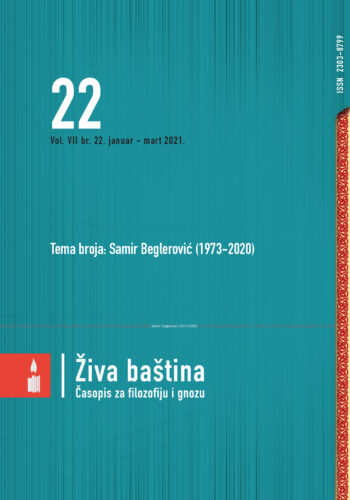UDK 28:78]
Autor u ovom tekstu govori o značaju muzike i njezinom neporecivom utjecaju na čovjekovu dušu, pri čemu naglašava da se spomenuto pitanje u pravnoj nauci ne može tretirati bez prethodnog upoznavanja s različitim muzičkim žanrovima, ali i s divergentim muzičkim kontekstima u kojima je muzika nastajala. Tako se, naprimjer, ono što bi se na Zapadu oslovilo muzikom, u islamskom svijetu neće tako osloviti, usljed određenih religijsko-kulturoloških specifičnosti kojih osoba mora biti svjesna kad pristupa fenomenološkoj razradi pitanja muzike. Naravno, neupitno je da su svi muslimanski učitelji saglasni da je muzika koja je lascivna i koja pobuđuje strasti zabranjena (haram), baš kao što su, uglavnom, saglasni da ona muzika koja snaži borbeni duh muslimana i pospješuje njihovu vezu (wisal) s Bogom ne samo da je dopuštena nego se svesrdno preporučuje i na nju se ohrabruje (mandub).
Ključne riječi: muzika, pravna nauka, duša, Zapad, islamski svijet, religijsko-kulturološke specifičnosti, strasti.
Islam and Music: The Legal and the Spiritual Dimensions
Seyyed Hossein Nasr
Abstract
In the text, the author discusses the significance of music and its undeniable influence on human soul, emphasizing that one cannot treat the abovementioned question in legal science without being previously acquainted with various musical genres, as well as with the divergent musical contexts in which the music originated. Thus, for example, what would be called music in the West would not be called so in the Islamic world, due to certain religious-cultural specifics that a person must be aware of when approaching the phenomenological elaboration of the question of music. Of course, it is unquestionable that all Muslim teachers agree that the music which is lascivious and induces passion is illicit (ḥarām), just as they, generally, agree that the music which strengthens the fighting spirit of Muslims and enhances their connection (wisāl) with God is not only permissible, but is wholeheartedly recommended and encouraged (mandūb).
Keywords: music, jurisprudence, soul, the West, the Islamic world, religious-cultural specifics, passions, connection with God
[tags]

